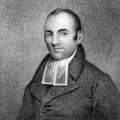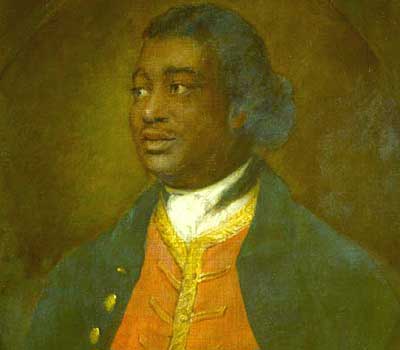35. Letters from the Heart: Ignatius Sancho and Benjamin Banneker
Ignatius Sancho and Benjamin Banneker make their mark on the history of Africana thought through letters that reflect on the power of sentiment.
Themes:
• I. Sancho, Letters of the Late Ignatius Sancho, An African, ed. V. Carretta (Peterborough: 2015).
---
• W. Andrews, "Benjamin Banneker's Revision of Thomas Jefferson: Conscience vs. Science in the Early American Antislavery Debate," in V. Carretta and P. Gould (eds), Genius in Bondage: Literature of the Early Black Atlantic (Lexington: 2001), 218-41.
• S.A. Bedini, The Life of Benjamin Banneker: The First African-American Man of Science, 2nd ed. (Baltimore: 1999).
• C. Cerami, Benjamin Banneker: Surveyor, Astronomer, Publisher, Patriot (New York: 2002).
• M. Ellis, "Ignatius Sancho's Letters: Sentimental Libertinism and the Politics of Form," in Genius in Bondage, 199-217.
• T. Jefferson, The Portable Thomas Jefferson, ed. M.D. Peterson (New York: 1975).
• R. Newman, ""Good Communications Corrects Bad Manners": The Banneker-Jefferson Dialogue and the Project of White Uplift," in J.C. Hammond and M. Mason (eds), Contesting Slavery: The Politics of Bondage and Freedom in the New American Nation (Charlottesville: 2011), 69-93.
• F.A. Nussbaum, "Being a Man: Olaudah Equiano," in Genius in Bondage, 54-71.
• S.S. Sandhu, "Ignatius Sancho and Laurence Sterne," Research in African Literatures 29 (1998), 88-105.
• K. Sandiford, Measuring the Moment: Strategies of Protest in Eighteenth-Century Afro-English Writing (Selinsgrove: 1988).
• H. Woodard, African-British Writings in the Eighteenth Century: The Politics of Race and Reason (Westport: 1999).
• J. Wright, "Ignatius Sancho (1729-1780), African Composer in England," The Black Perspective in Music 7 (1979), 132-67.







Comments
Jefferson
Great episode! I will offer one correction: it isn't true that Thomas Jefferson is "known" to have fathered children with Sally Hemings. All we know is it was a Jefferson male, of which there were quite a number in the area. Thomas's much-younger brother Randolph is a good candidate. A Monticello slave said that he would "come out among black people, play the fiddle and dance half the night." Indeed, though it is often repeated that the oral history of Hemings' descendants says they descended from Thomas Jefferson, it is actually the case that many family members grew up hearing that they descended from an uncle, cousin or other male relative of Thomas. Not only that, but the story's origin as a slander in a local newspaper occurred years before the first of Hemings' children was born. I could say more but suffice it to say that this is not an established fact we are dealing with here.
In reply to Jefferson by Thomas Mirus
Jefferson and Hemings
Hm, interesting. Well I am not an expert on this and Chike may know more about it than I do. Just looking around on the internet it looks like there is a controversy but Monticello and the TJ Foundation accept that he was the father. I am not sure it matters that much for the point we were making - if not him but his close family members were fathering children with his slaves, then how would that be any less evidence of his hypocrisy?
In reply to Jefferson by Thomas Mirus
Fine to be careful
I disagree with Peter about whether Jefferson could be called hypocritical in the second way mentioned in the episode if it were a close family member rather than he who fathered Sally Hemings' children (and if there is no other evidence of him having sex with black women). I don't think decrying something your brother does is hypocritical. Now, as Peter points out, it's easy to see that the dominant opinion today is that Jefferson fathered the children, so I'm not worried that we made a major blunder here... but I would nevertheless be fine with us re-wording to something more conditional such as "if it is true that Jefferson fathered six children with his slave Sally Hemings, he is once again hypocritical here."
In reply to Fine to be careful by Chike Jeffers
Right. I just think it is
Right. I just think it is important to be careful, especially at a time when some people think it suffices to say "Sally Hemings" to dismiss Jefferson's entire legacy. Of course that is not what you were doing.
Adding to Chike's point, we might imagine Jefferson using his writings as a passive-aggressive say of criticizing his brother. Who knows...
In reply to Fine to be careful by Chike Jeffers
And to get philosophical, it
And to get philosophical, it seems as though saying he is "known" to have done this is an even stronger statement than if you had just asserted that he did it.
In reply to Jefferson by Thomas Mirus
Jefferson
I will second the objection made by Thomas. It stood out to me as soon as I heard it.
It's important to be strictly accurate on things like this. If I know you're not strictly accurate on something like this where I have a little knowledge, I have to assume that you're not being strictly accurate on things where I don't know enough for that to stand out to me as soon as I hear it. One bad apple may taint your whole barrel. One loose sentence undermines the trust in your whole series.
The first time I experienced this was with Malcolm Gladwell. He was writing about something I was familiar with. What he said was true. Nothing he said was false. But he wasn't telling the full story and was giving a misleading account because of that. Perhaps it made for a more punchy piece, or a more easily digestible piece. Perhaps because that fitted better with his wider narrative. I can't remember. Don't read him anymore. I can't trust what he writes.
None of us will be impeccable. I can only imagine all the reading and writing you must both do with all the various projects you're involved in. Easy for something to slip. You also have a public comments page where this kind of thing can be challenged and discussed.
Still, when I hear something like this, it does make me pause.
Education
When you said this ...
Sancho too points to the power of the written word and how it was withheld from him as a form of oppression, which then served to make his later mastery of it a central component and symbol of his freedom.
... it resonated with me. It was a contrast to my experience of schooling. Learning was white. Not for us. This is overstating it somewhat, but it was definitely there. I get the impression the same is true in many parts of the US today. Not sure if it still holds for the UK today.
What was true for Sancho could also have been said about Frederick Douglas. He wrote a lot about how avaricious he was for learning. As a boy he spent much of his money paying white boys for secret tutoring. Later he tried to set up a school for slaves at the some risk to them and himself.
Maybe people just value something a lot more, if they personally have to fight to get it. Another relevant example is the vote. If it's given to someone at no cost, perhaps they take it for granted, understanding it as something with little worth.
Lawrence Sterne
In one of his letters to Sterne, Sancho praises Sterne for writing this:
”Consider how great a part of our species – in all ages down to this—have been trod under the feet of cruel and capricious tyrants, who would neither hear their cries, nor pity their distresses.—Consider slavery—what it is—how bitter a draught—and how many millions are made to drink it!”
Add new comment